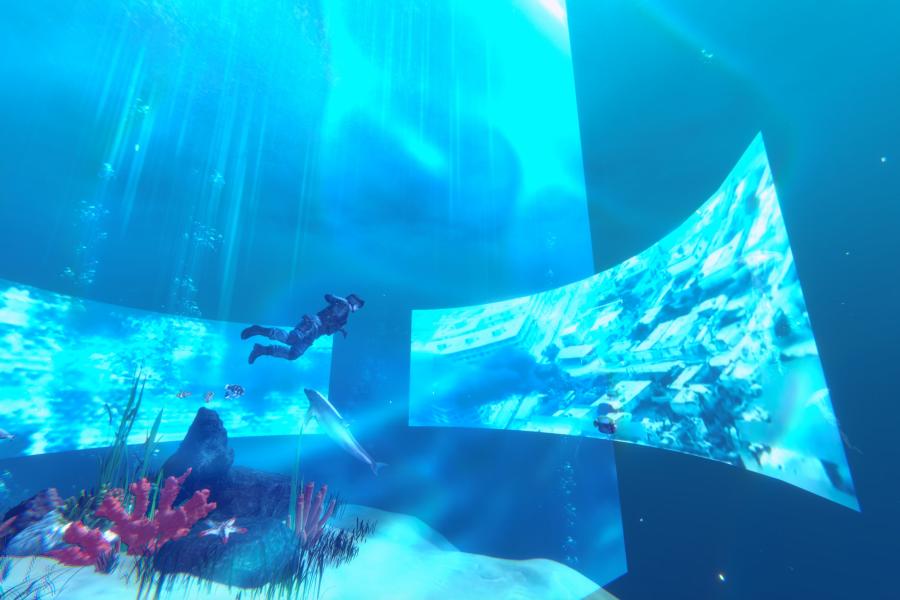Virtual Leonardo’s Submarine is Hito Steyerl’s first solo project with Esther Schipper and the first virtual exhibition organized by the gallery. The project is organized in collaboration with Andrew Kreps Gallery, New York.
Originally conceived in 2019 as a video environment for the 58th Venice Biennale, Leonardo’s Submarine has been completely reworked as a Virtual Reality (VR) experience.
Upon entering the virtual space—via the means of a VR headset or by web browser version—viewers will find themselves floating under water, surrounded by fish, seaweed, and coral. The artist’s avatar, outfitted in full PEOPLE gear, swims alongside.
Leonardo’s Submarine is projected on three virtual curved screens that surround the viewer. The three-channel video draws a parallel between Leonardo da Vinci’s primitive submarine—first sketched in the early 16th century—and Leonardo S.p.A., formerly Leonardo-Finmeccanica, an Italian global high-tech company and one of the key players in aerospace, defense and security. Leonardo S.p.A, partially owned by the Italian government through the Ministry of Economy and Finance, has supplied weapons used by the Turkish armed forces against civilians in Syria and sold war planes to Saudi Arabia.
In 1515, Leonardo designed a weapon that would allow Venice to defend itself from the attacks of the Ottoman Empire: a proto submarine that could sink enemy ships inadvertently. Despite the fact that the Doge of the Republic would have rewarded him generously, Leonardo decided to bury his invention under obscure descriptions and cyphered diagrams. Leonardo eventually concluded that people were too evil to handle such a destructive technology.
Steyerl embarks the viewer on a metaphorical journey aboard Leonardo’s vessel. Venice’s laguna, palazzi and skies, generated by Artificial Intelligence video processing, flow dreamlike and foreign, while a voice-over speaks of technology, power, corruption, art and warfare, topics that the artist has explored thoroughly over the last years.
The VR experience offered by Virtual Leonardo’s Submarine echoes Steyerl’s concept of a Bubble Vision which she developed during her 2018 lecture at the Yale School of Art. VR experiences place the viewer at the center of an environment while also disembodying them: “The viewer is absolutely central, but at the same time, he or she is missing from the scene. (…) Is this ‘bubble vision’—this 360-degree vision—a training scheme to adapt humans to a world from which they are increasingly missing because they have been replaced by invisible systems or automation or robot?” asks Steyerl.
Earlier this year, a previous version of Virtual Leonardo’s Submarinepremiered on the website of K21 Kunstsammlung Nordrhein-Westfalen, Dusseldorf, on the occasion of the artist’s survey exhibition: I Will Survive.
 - Mit freundlicher Genehmigung von: estherschipper
- Mit freundlicher Genehmigung von: estherschipper - Mit freundlicher Genehmigung von: estherschipper
- Mit freundlicher Genehmigung von: estherschipper